democracynow.org
Stories:
 "A Shameful Moment for This Country": Report Back on Militarized Police Raid of DAPL Resistance Camp
"A Shameful Moment for This Country": Report Back on Militarized Police Raid of DAPL Resistance Camp
We go to Standing Rock, North Dakota, for an update on how hundreds of police with military equipment raided a resistance camp Thursday that was established by Native American water protectors in the path of the proposed $3.8 billion Dakota Access pipeline. More than 100 officers in riot gear with automatic rifles lined up across a highway, flanked by multiple MRAPs, an LRAD sound cannon, Humvees driven by National Guardsmen, an armored police truck and a bulldozer. Water protectors say police deployed tear gas, mace, pepper spray and flash-bang grenades and bean bag rounds against the Native Americans and shot rubber bullets at their horses. "We learned a lot about the relationship of North Dakota to Native people," says Tara Houska, national campaigns director for Honor the Earth. "I was standing next to a group of teenagers that were all maced in the face. … Myself, I actually was almost shot in the face by bean bag round."
TRANSCRIPT
This is a rush transcript. Copy may not be in its final form.
AMY GOODMAN: This is Democracy Now!, democracynow.org, The War and Peace Report. I’m Amy Goodman, with Juan González.
JUAN GONZÁLEZ: We turn now to North Dakota, where on Thursday hundreds of police with military equipment raided a resistance camp established by Native American water protectors in the path of the proposed $3.8 billion Dakota Access pipeline, which has faced months of resistance from the Standing Rock Sioux Tribe and members of hundreds of other tribes from across the Americas. On Thursday afternoon, over a hundred officers in riot gear with automatic rifles lined up across North Dakota’s Highway 1806, flanked by multiple MRAPs—that’s mine-resistant ambush protected military vehicles—sound cannon, Humvees driven by National Guardsmen, an armored police truck and a bulldozer. Water protectors say that police deployed tear gas, mace, pepper spray and flash-bang grenades and bean bag rounds against the Native Americans and shot rubber bullets at their horses. This is a video shot by Unicorn Riot, followed by a Facebook Live video from Sacheen Seitcham of the West Coast Women Warriors Media Cooperative.
SACHEEN SEITCHAM: They’ve been pepper-spraying. They’ve maced. They’ve tasered. They’ve thrown percussion bombs and smoke grenades at us. All for water. Over 300 pigs. We are protecting the water. They’re protecting oil. That’s what’s happening.
AMY GOODMAN: Water protectors set up a blockade of the highway using cars, tires, fire in order to try to protect their camp, parts of which were demolished by police. Four people locked themselves to a truck parked in the middle of the highway in order to stop the police advance. Elders also led prayer ceremonies in front of the police line. Some were arrested in the middle of prayer. In total, more than 100 people were arrested. Ahead of the police raid, the Federal Aviation Administration also issued a temporary no-fly zone for the airspace above the resistance camps for all aircraft except for those used by law enforcement. Police appeared to be evicting the frontline camp in order to clear the way for the Dakota Access pipeline company to continue construction. Company cranes and bulldozers were active Thursday just behind the police line on the site of the sacred burial ground where Dakota Access security guards unleashed dogs on Native Americans on September 3rd. We’re going to turn to Dallas Goldtooth of the Indigenous Environmental Network, this clip from the front line.
DALLAS GOLDTOOTH: This is at the front line of the Dakota Access pipeline fight right here. And we are about one—about two miles from the river to the west here—or east, sorry. And to the west, right over this hill, Dakota Access is doing construction, trying to get to this road right here. So there is a police line on top of the hill here with Dakota Access workers and police protecting the workers.
AMY GOODMAN: That’s Dallas Goldtooth. And before that, you hear the LRAD, the long-range acoustic device.
For more, we’re joined by Tara Houska, national campaigns director for Honor the Earth.
Welcome back to Democracy Now!, Tara. Explain what took place yesterday, I mean, the video and the photos that we have of the military hardware, a raid against the protesters.
TARA HOUSKA: Yesterday we saw that—you know, we saw—we learned a lot about the relationship of people to fossil fuels. We learned a lot about the relationship of North Dakota to Native people. And we learned a lot about America and where we stand.
Yesterday, we saw folks being maced. I was standing right next to a group of teenagers that were all maced in the face, maced right—like all kinds of people. Myself, I actually was almost shot in the face by bean bag round. It ricocheted off a truck right next to my head. These police were actively trying to hurt people, pushing them back to allow construction of the Dakota Access pipeline. They were defending monetary interests as human beings were being physically hurt. You know, I saw—I saw, right in front of me, a group of police officers pull a protester forward and begin beating him over the head with sticks. There’s video of it that you can see. I mean, this was an all-out war that was waged on indigenous protectors that were doing nothing more than peacefully assembling. There was no fires, there was nothing like that, until the police began their violent attack on us.
JUAN GONZÁLEZ: And, Tara, where was this incident in—for instance, in relationship to the September 3rd dog attacks at the tribal burial site?
TARA HOUSKA: When Dakota Access jumped ahead over 20 miles to destroy the site that had just been identified by the tribe the day before as a sacred place, that happened on September 3rd. That’s also the anniversary of the Whitestone Hill massacre. That was the exact place the day that Dakota Access was basically constructing its pipeline, right in the background, as literally hundreds and hundreds of people came to stand and pray and bring all of their energy forward to stop this from happening. And it was right at that site where Native American men, women and children had been attacked by private security, by dogs and mace and all the same things that we saw yesterday—this incredible escalated violence against people that were doing nothing more than trying to stop the destruction of sacred sites right in front of their eyes.
AMY GOODMAN: Tara, you saw rifles aimed directly at people, police aiming those rifles?
TARA HOUSKA: Yes, there were police walking around everywhere with assault rifles. Directly across from us, there was actually a policeman holding his rifle trained on us, directly on us. Bean bag rifle assault—bean bag non-lethal weapons were also aimed at us. Every time we put our hands up, they’d put them down. As soon as our hands came down, they would aim back at us. Police officers were smiling at us as they were doing these things. There were police officers filming this, laughing, as they—as human beings were being attacked, being maced. I mean, it was a nightmarish scene. And it should be a shame to the federal government, it should be a shame to the American people, that this is happening within U.S. borders to indigenous people and to our allies, to all people that are trying to protect water. Yesterday was a really shameful moment for this country and where we stand.
AMY GOODMAN: And the number of people you estimate were arrested, Tara?
TARA HOUSKA: I saw dozens of people being arrested. I mean, they were just pulling people out and arresting them. You know, I saw—I actually had to get pulled back from a group that—I mean, the police were pushing forward and just grabbing people at will. We had a number of lockdowns, like that were right in front of us in this truck in the middle of the road, that was used to attempt to blockade these police from advancing forward. There were five people, actually, that were locked to that. They attempted to construct a tipi in the middle, right behind people that were praying and singing. And they—there were folks that locked down to that tipi, or attempted to. The police ripped that tipi down and ripped those people out. It was—it was a really horrible scene yesterday.
 Indigenous Youth Occupy Hillary Clinton Campaign Headquarters to Demand She Take Stand on #DAPL
Indigenous Youth Occupy Hillary Clinton Campaign Headquarters to Demand She Take Stand on #DAPL
Just minutes before the the police raid on the camp in North Dakota, here in New York City Native American youth flooded the campaign headquarters of Democratic presidential nominee Hillary Clinton to demand that she oppose the Dakota Access pipeline. Clinton’s opponent in the Democratic primary, Vermont Senator Bernie Sanders, has come out against the pipeline. But Clinton has so far refused to take a stance. "We wanted to bring our songs and prayer to tell [Clinton] that the Native youth of this nation do not want this pipeline," says our guest Daniel Grassrope of the Lower Brule Sioux Nation in South Dakota, who was part of the group who set up a tipi in the entrance to Clinton’s office.
TRANSCRIPT
This is a rush transcript. Copy may not be in its final form.
JUAN GONZÁLEZ: Well, just minutes before the police raid on the camp in North Dakota, here in New York City, Native American youth flooded the campaign headquarters of Democratic presidential nominee Hillary Clinton to demand that she oppose the Dakota Access pipeline. Clinton’s opponent in the Democratic primary, Vermont Senator Bernie Sanders, has come out against the pipeline, but Clinton has so far refused to take a stand.
AMY GOODMAN: Well, in an email to Democracy Now!, Clinton campaign spokesperson Tyrone Gayle wrote, quote, "Secretary Clinton has been clear that she thinks all voices should be heard and all views considered in federal infrastructure projects. Now, all of the parties involved—including the federal government, the pipeline company and contractors, the state of North Dakota, and the tribes—need to find a path forward that serves the broadest public interest. As that happens, it’s important that on the ground in North Dakota, everyone respects demonstrators’ rights to protest peacefully, and workers’ rights to do their jobs safely," unquote.
Well, for more, we’re joined by Daniel Grassrope of the Lower Brule Sioux Nation in South Dakota. He was part of the Native American youth who flooded into Clinton’s campaign headquarters. You built a tipi there in Brooklyn in the campaign headquarters, Daniel?
DANIEL GRASSROPE: Yes, we did. We wanted to demonstrate a cultural event in Hillary’s campaign office. And we wanted to bring our songs and prayer to tell her to oppose this pipeline, that the youth, the future leaders of this nation and the future occupiers of this nation, do not want this pipeline, because it will affect our water.
AMY GOODMAN: A group of you flew in from Standing Rock?
DANIEL GRASSROPE: Yes. There was 11 of us that flew in from Standing Rock.
JUAN GONZÁLEZ: And no one from the campaign was willing to sit down and talk with you at all?
DANIEL GRASSROPE: No one from the campaign wanted to talk to us. We called out for leaders from her campaign management. And the security officers didn’t want to take the letter that we’re demanding to oppose this pipeline. And also the secretary at the front desk didn’t want to take the letter, as well.
JUAN GONZÁLEZ: And the importance of this struggle to you and other young Native Americans across the country?
DANIEL GRASSROPE: The struggle, well, we’re trying to protect our water, and right now it’s being threatened by this pipeline. And everyone in the Native nation knows that water is our first medicine. Water brings life to everything—the plants, the trees, the four-legged, you know, the animals that we eat, everything. It brings life to us, in general. And it’s just—you know, it’s very important that we have water.
AMY GOODMAN: I wanted to turn to a quote we read in the headlines of Bill McKibben—Bill McKibben, the founder of 350.org—after he read the statement that the Clinton campaign put out. And it is the first time that Hillary Clinton, at least her campaign, has put out a statement on the Dakota Access pipeline. Bill McKibben said, "@HillaryClinton managed to make a statement about the Dakota Pipeline that literally says nothing. Literally." Daniel, what about their response, that they did put out a statement? And do you think it’s satisfactory?
DANIEL GRASSROPE: The response that I get, she’s telling people that—on the ground at the—North Dakota, that everyone respects the demonstrators’ rights to peacefully protest. And as protectors of land, we are peaceful. We are there peacefully. We’re not there to violent or engage in any violent activity. We are there to stop this pipeline through prayer, and that’s what we’ve been doing from the beginning.
AMY GOODMAN: And how did you organize to come out here, to come to the national headquarters of Hillary Clinton from North Dakota, from Standing Rock? And you came to North Dakota from South Dakota.
DANIEL GRASSROPE: There’s actually organizers beyond us that had that idea and brought it to us. And we are just, you know, happy to be a part of it.
AMY GOODMAN: Well, we’re going to go right now upstate New York. Daniel Grassrope, thanks so much for being with us.
 Will the DOJ or FCC Stop the AT&T Merger from Creating World's Largest Media Conglomerate?
Will the DOJ or FCC Stop the AT&T Merger from Creating World's Largest Media Conglomerate?
Telecommunications giant AT&T has agreed to purchase Time Warner for $85 billion. If approved by federal antitrust regulators, the megamerger would give AT&T control over Warner Bros. film and television studios, along with CNN, TNT, HBO and many other brands. Critics warn of further limits to competition and higher prices for customers. The merger could also allow AT&T to give preferential treatment to streaming video from Time Warner’s companies, which would violate the principles of net neutrality. Meanwhile, AT&T is bracing for what is expected to be a lengthy antitrust review of the deal, which must be approved by the U.S. Justice Department and possibly by the FCC. "If you’re not a Time Warner shareholder, ... if you’re not a Wall Street banker, there is very little in this deal for you," says Craig Aaron, president and CEO of Free Press, which has come out against the multibillion-dollar merger.
TRANSCRIPT
This is a rush transcript. Copy may not be in its final form.
JUAN GONZÁLEZ: We begin today’s show with the proposed merger of telecommunications giant AT&T and Time Warner. AT&T has agreed to purchase Time Warner for $85 billion. If approved by federal antitrust regulators, the merger would give AT&T control over Warner Bros. film and television studios, along with CNN, TNT, HBO and many other brands. Critics warn of further limits to competition and higher prices for customers. The merger could also allow AT&T to give preferential treatment to streaming video from Time Warner’s companies, which would violate the principles of net neutrality. On the campaign trail, both Hillary Clinton and Donald Trump addressed the merger.
HILLARY CLINTON: Look, I think it raises questions and concerns, and they should be looked into. I hear the Congress will start having bipartisan hearings, which I think is appropriate. So I’m going to follow it closely. And obviously, you know, if I’m fortunate enough to be president, I will expect the government to conduct a very thorough analysis before making a decision.
DONALD TRUMP: They’re trying desperately to suppress my vote and the voice of the American people. As an example of the power structure I’m fighting, AT&T is buying Time Warner, and thus CNN—a deal we will not approve in my administration because it’s too much concentration of power in the hands of too few.
JUAN GONZÁLEZ: Meanwhile, AT&T is bracing for what is expected to be a lengthy and tough antitrust review of the proposed merger. The deal would need approval of the U.S. Justice Department, and possibly the FCC’s approval. Wall Street analysts are trying to determine the likelihood of that approval. This is Barclays Capital Managing Director Amir Rozwadowski.
AMIR ROZWADOWSKI: Well, it’s difficult to put specific odds right now. I think that, you know, we’re digesting the fact that this was just announced very recently. But I think that, on paper, you know, there is precedent, and precedent generally is a good framework in terms of providing additional support for regulatory approval. The challenge, of course, is that we’re in a different political environment, in a different regulatory environment. And so, with this deal being announced on the eve of an election and, you know, what type of people will be put into place post that election really will factor into some of the decisions being made about the approval of this transaction.
AMY GOODMAN: AT&T has clashed with the FCC in recent years on a number of fronts. The company was among those that sued the FCC in 2015 to block the Obama administration’s landmark rules on net neutrality, which bar internet service providers from obstructing or slowing down consumer access to web content.
Meanwhile, new details have emerged about how AT&T has been spying on Americans for profit. The Daily Beast reports AT&T is keeping private call records and selling the information to authorities investigating everything from the war on drugs to Medicaid fraud. The secret plan is called Project Hemisphere. AT&T reportedly has been retaining every call, text message, Skype chat or other communication that’s passed through its infrastructure. Some of the records date back to 1987. Sheriff and police departments each pay upwards of $1 million a year for access to the call records. No warrants are needed, and AT&T requires governmental agencies to keep secret the source of the information.
Well, for more, we’re going to go to Craig Aaron, president and CEO of Free Press, which has come out against the multibillion-dollar merger of AT&T and Time Warner.
Welcome to Democracy Now!, Craig. Talk first about the significance of this megamerger.
CRAIG AARON: Well, megamerger is right, Amy. I mean, I think the first thing for people to keep in mind is just how big this deal is. In addition to the $85 billion that is going to the shareholders at Time Warner, AT&T is taking on another $22 billion in debt. So this is over $100 billion. And we need to ask ourselves: For what? What is the benefit? If you’re not a Time Warner shareholder, if you’re not a senior executive, if you’re not a Wall Street banker, there is very little in this deal for you except higher prices and a new gatekeeper over what you watch, see, hear and read every day. And so that’s why we’ve come out strongly against this merger. We don’t think it’s in the public interest. And we think it has huge problems, putting this much media power in—under one corporate umbrella.
JUAN GONZÁLEZ: And, Craig, this reminds me, just a few years ago, back in 2011, when Comcast took over NBCUniversal and Telemundo. And at the time, Comcast was able to marshal support from many of the African-American and Latino leaders in the country with promises of more diversity. Of course, famously, they put Al—they gave Al Sharpton a show for a while, subsequently, after that. But then, as soon as all the hullabaloo calmed down, then all of a sudden they started to reduce that kind of diversity in their programming.
CRAIG AARON: Right. I mean, every time they want to get one of these deals done, suddenly a company like AT&T or Comcast remembers that, hey, now we’re going to finally provide broadband to poor people in low-income communities. They make all these [promises] about new kinds of programming and promotion, but you can look back at the record of merger after merger, and most of those promises end up being broken. And once the weak conditions expire, if they even bother to follow them at all, all those promises go away, but we’re still left with this incredible concentration of power.
And if AT&T can get this deal done—they’re already, after taking over DirecTV, the biggest satellite TV company in the country. They have the most video subscribers in the country. They’re the second-biggest wireless company. They have a huge internet footprint. And now they want to own big channels like CNN, HBO, TNT, so that they can really control how that information flows, and so they can cross-subsidize themselves, move—they get to move the money from one pocket to another while raising the costs on everybody else. And the people who are going to end up paying in the end are going to be their own subscribers, who really don’t have anywhere else to turn. It’s going to show up on their monthly bills. And all these promises we’re going to hear week after week, those will disappear.
AMY GOODMAN: So, you have AT&T currently number 10 on the Forbes 500 list, one of the U.S. highest-grossing companies; Time Warner is number 99 on the list—10 and 99 forming this enormous company. Some of the pros being talked about, Craig, are the promise of new kind of content, AT&T forecasting a new phase of video innovation and arguing that the deal will unleash this. How do you answer those?
CRAIG AARON: Well, I don’t see how AT&T is going to do all this innovation when they’re so indebted. You know, I think you look at what Wall Street’s saying about this deal, and there are a lot of concerns about them having to pay off all this debt. Where is all this money going to come to invest in new products?
And second of all, are there really going to be consumer benefits in those new products, or is AT&T just going to be locking down the content, favoring their own content, making it harder for people to get what they want? What people want to do is be able to watch whatever they want at any time. What these kind of corporate mergers do is lock down that content. We can just look at what happened with Comcast and NBC. A lot of us maybe were interested in watching the Olympics over the summer. When we went on to try to do that, we were like, "Hey, how come I can’t just stream any event I want, whenever I want, online?" Well, the reason you couldn’t do that is because Comcast owned all the rights. They owned the TV rights. They owned the internet rights. And they decided that it was going to make them more money to lock you in and force you to watch it when they wanted you to watch it than when you wanted to do it. And AT&T is looking at that and saying, "Hey, we want to be able to do that, too."
JUAN GONZÁLEZ: And what’s been the reaction on Wall Street to this merger? Because, remember, back in 2000, when AOL and Time Warner merged, it was—it was billed as one of the visionary mergers, and it turned out to be a colossal failure.
CRAIG AARON: Well, I think that’s what’s so interesting about this merger, Juan, is that normally at this point, when one of these deals is announced, I’m the only one running around saying, "Hey, wait. This can be stopped. This is a bad idea." But this merger has not been well received, not by politicians, and not by Wall Street, either, numerous analysts being quoted that, at best, it’s a 50-50 coin flip, and many saying that they think there’s an even worse chance that it will be approved, and a lot of questions actually being raised on Wall Street to say, "Wait. What do we need this deal for? Where are the benefits? How is this going to sort of spur innovation?" and really being seen by some as more of a desperate move by AT&T. But that doesn’t make it any less dangerous, because it would lock so much content and control under the AT&T umbrella. So I think Wall Street is surprisingly skeptical about this deal, which is good news. And the politicians are a lot more skeptical about this deal, which is very good news, because it makes it a—this is really a decision that’s going to be made as a result of a political fight, a fight in Washington. And the fact that so many politicians in both parties are actually out so strongly against this merger from the start, I think, is an encouraging sign that it could actually be derailed and stopped, which would be in everybody’s best interest.
The original content of this program is licensed under a Creative Commons Attribution-Noncommercial-No Derivative Works 3.0 United States License. Please attribute legal copies of this work to democracynow.org. Some of the work(s) that this program incorporates, however, may be separately licensed. For further information or additional permissions, contact us. ... Read More →
 Standing Rock Sioux Tribal Chair: DOJ Must Investigate Use of Force Against #DAPL Resistance
Standing Rock Sioux Tribal Chair: DOJ Must Investigate Use of Force Against #DAPL Resistance
"I knew North Dakota state was planning something," says Standing Rock Sioux Tribal Chair Dave Archambault II of the raid on a resistance camp Thursday by militarized police. "They set up a pre-hospital tent near the camp. … That was sending me signals this was going to get out of hand." Archambault says he asked the Department of Justice to step in and ask the state not to proceed with the raid, and now calls on the Justice Department to launch an investigation into the use of force against those resisting the Dakota Access pipeline.
TRANSCRIPT
This is a rush transcript. Copy may not be in its final form.
AMY GOODMAN: For more on the escalating standoff at Standing Rock, we’re joined by the Standing Rock Sioux tribal chairman, Dave Archambault. He’s asked the Justice Department to launch an investigation into the use of force against those resisting the Dakota Access pipeline.
Chairman Dave Archambault, thanks so much for joining us. What have you asked the DOJ, and what have they told you, as this heavily militarized police off—standoff against the Native Americans of your tribe and so many others?
DAVE ARCHAMBAULT II: Thank you, Amy, for having me on here. You know, I approached the Department of Justice a couple days ago, because I knew that the North Dakota state was planning something. They deployed—the North Dakota Department of Human Services set up a pre-hospital tent near the camp. And that brought concern to me. That was telling me, sending me signals that, you know, this is going to get out of hand. So I asked the Department of Justice to step in and ask the state not to come forward with the raid. I also asked them to talk to the company, Dakota Access pipeline, and stop construction, cease construction. This is getting too out of hand.
And so, what they ended up coming back with was the state is ready to negotiate. The state is willing to sit down and talk to you. But the company was not willing to stop construction. They want to force their hand on everybody. And it’s pitting the protesters, protectors, demonstrators, up against law enforcement. And law enforcement is starting to use severe aggression, severe force on our members, on all of those who support us, who are there with us. And it’s unlawful.
Now, we are asking the Department of Justice to hold the state accountable. They knew this was going to happen. They knew it was coming forward. So did the company. They just keep pushing forward, and they box us into the corner, and they expect us to let it be.
And right now what we’re trying to do is protect water. That’s the whole thing, is just protect water. Why is that such a hard thing for the state understand? Why is it such a hard thing for the company to understand? We need to help the world realize what is going on here, and understand the importance of water and the treatment to our members, to our supporters, the unlawful treatment. If you ask yourself, "Who has the weapons? And who is praying? Who"—if you look at the videos, you’ll see people praying and singing, and then you’ll see militarized law enforcement with weapons. They’re the ones who have weapons. They’re the ones who are being aggressive. And they’re the ones who are causing harm. We had over 30 to 40 people with severe bruises, welts from rubber bullets, broken bones from the harsh treatment. It’s just not right.
AMY GOODMAN: And finally, very quickly, LRAD, the long-range acoustic device, the piercing sounds that make people sick; the armored vehicles, the MRAPs—where does the police department—where does the Morton County Sheriff’s Department get these military weapons?
DAVE ARCHAMBAULT II: You know, why can’t we have somebody come in and stop that and get some weapons out of their possession, get these weapons out of their possession? Because it’s unnecessary. We need some—we need the federal government to step in and start protecting us from the state officials. It’s uncalled for. And I don’t know where they get the weapons. I’m assuming the National Guard is doing it.
And we need—maybe it’s the U.N. that needs to step in to keep the peace, because the federal government, the United states, all we have to do is deny this easement, and this will all go away. Reroute this pipeline, and this will all go away. Save—protect our water, this will all go away. Deny the easement. President Obama needs to step up now, deny the easement. Hillary Clinton needs to make a firm statement about this and stop trying to ride the fence. We want people to have safe jobs, too, but we want them also to have safe drinking water. And for her to say that—we’ll let the union workers reroute this pipeline away from water, and we’ll protect them so they have safe jobs and everybody’s happy. All the politicians, all the people who get oil industry contributions for their campaigns, the economy, the national security, the energy independence will all be there. Just reroute this, deny the easement, and let’s put an end to this, once and for all.
AMY GOODMAN: Dave Archambault, we want to thank you for being with us, chair of the Standing Rock Sioux Tribe. We’re going to take a short 30-second break and then go to talk about Venezuela. Stay with us.
The original content of this program is licensed under a Creative Commons Attribution-Noncommercial-No Derivative Works 3.0 United States License. Please attribute legal copies of this work to democracynow.org. Some of the work(s) that this program incorporates, however, may be separately licensed. For further information or additional permissions, contact us.
 Electronic Frontier Foundation: Police Depts. Paid AT&T Millions to Scrutinize Our Texts & Chats
Electronic Frontier Foundation: Police Depts. Paid AT&T Millions to Scrutinize Our Texts & Chats
New details are emerging about how AT&T has been spying on Americans for profit with a secret plan called Project Hemisphere. The Daily Beast reports AT&T is keeping private call records and selling the information to authorities investigating everything from the war on drugs to Medicaid fraud. AT&T reportedly has been retaining every call, text message, Skype chat or other communication that has passed through its infrastructure. Some of the records date back to 1987. Sheriff’s and police departments each pay upward of $1 million a year for access to the call records. No warrants are needed, and AT&T requires governmental agencies to keep secret the source of the information. We speak with Adam Schwartz, a senior lawyer at the Electronic Frontier Foundation. His latest article is "AT&T requires police to hide Hemisphere phone spying."
TRANSCRIPT
This is a rush transcript. Copy may not be in its final form.
JUAN GONZÁLEZ: Well, all of this comes as new details are emerging about how AT&T has been spying on Americans for profit. The secret plan is called Project Hemisphere. The Daily Beast reports AT&T is keeping private call records and selling the information to authorities investigating everything from the war on drugs to Medicaid fraud. AT&T reportedly has been retaining every call, text message, Skype chat or other communications that passed through its infrastructure. Some of the records date back to 1987. Sheriff and police departments across the country each pay upwards of a million dollars a year for access to the call records. No warrants are needed, and AT&T requires governmental agencies to keep secret the source of information.
AMY GOODMAN: A 2014 statement of work from AT&T to the city of Atlanta published by The Daily Beast outlines the secrecy AT&T demanded. It reads, quote, "[T]he Government agency agrees not to use the data as evidence in any judicial or administrative proceedings unless there is no other available and admissible probative evidence. The Government Agency shall make every effort to insure that information provided by the Contractor is non-attributable to AT&T if the data is provided to a third-party."
Well, for more, we want to bring in Adam Schwartz to this conversation, senior lawyer at the Electronic Frontier Foundation. His latest article, "AT&T requires police to hide Hemisphere phone spying."
So, explain. What is this Project Hemisphere?
ADAM SCHWARTZ: [inaudible] the largest known, possibly the biggest, database of telephone metadata that the government is using to spy on us. Every day, the database grows by literally 4 billion records. As you said, it has records going back to the 1980s. And police are using powerful algorithms to scrutinize this database of everyone that we are having telephone and other digital communications with, to discover our personal relationships, whether we’re talking to a psychiatrist or a criminal defense lawyer or a union organizer on the telephone. We view this as a menace to our privacy. And one of the most disturbing features of it is how it has been kept a secret, so that the public and the courts and Congress cannot scrutinize this program and decide whether we even want it.
JUAN GONZÁLEZ: Well, and how are they able to do this? Why are they not—why are the law enforcement agencies not required to have court-ordered subpoenas to obtain these records?
ADAM SCHWARTZ: Well, that’s a great question. Under federal statutes that protect our privacy, ordinarily, the police do have to go to a judge and get some kind of approval before they get this metadata of who we’re talking to. What AT&T has required the police to do, through the provision of the contract that you just read, is what the police call "parallel construction" and what the EFF calls "evidence laundering." And what this means is, after the police find evidence against someone in the Hemisphere database, they "wall it off," quote-unquote from their training manual, and then they use a traditional subpoena to recreate the exact same evidence trail. And when it comes time to put the person on trial, they present the second set of cleaner evidence, and no one is the wiser that they were using this massive, disturbing digital database to spy on all Americans, including the criminal suspect.
JUAN GONZÁLEZ: But wouldn’t there be a requirement for the company to at least notify their consumers that they’re participating in something like this?
ADAM SCHWARTZ: Yeah, unfortunately, there isn’t. You know, AT&T, in its public comments about Hemisphere, has suggested they are merely responding to government requests for information, the same way that all kinds of providers of consumer services have to respond. In fact, as we see through the contract that AT&T wrote, which came to light earlier this week in The Daily Beast, it is AT&T who was demanding of government that the program be kept a secret. We don’t know what AT&T’s motive is to demand the secrecy. Perhaps it’s because AT&T is literally making millions of dollars a year from government agencies in exchange for providing this unique database of telephone records to the police for their scrutiny.
AMY GOODMAN: So the police might pay up to—one police department somewhere might pay like a million dollars to get this information?
ADAM SCHWARTZ: Yeah, just to be clear, there is a task force of federal, state and local officials called the HIDTAs, the High Intensity Drug Trafficking Areas, and it is funded by the White House Office of National Drug Control Policy. And the HIDTAs have three regional centers across the country, where AT&T employees are posted along with DEA agents and other law enforcement. And that is the entry point for law enforcement to the AT&T Hemisphere database. And the funding is a little bit shadowy, but it is clear that at one of these three HIDTA centers, White House funds, to the tune of a million dollars a year, are going to the HIDTA, in turn, going to AT&T. So it’s not a million dollars from each agency, but it is millions of dollars in total.
JUAN GONZÁLEZ: And, Adam Schwartz, am I correct on this, that AT&T is not—does not only provide information on their own customers, but on other carriers who possibly may be going through the AT&T infrastructure, as well?
ADAM SCHWARTZ: That’s exactly correct. Any consumer, whether they are not—whether or not they are with AT&T, when a call goes through an AT&T switch, it goes into the Hemisphere database. So, for example, if you’re using roaming, away from your own carrier’s network, and you’re using AT&T’s network, then your call goes into the Hemisphere database—again, 4 billion records per day from American consumers and for international calls into the Hemisphere database.
AMY GOODMAN: And the significance of broadband internet providers having to ask permission if they want to sell customers’ private data to third parties, the ruling that was just adopted Thursday by the FCC?
ADAM SCHWARTZ: You know, I think that the critical principle here is that consumers should have control over their data, and corporations should not be diverting that data for their own profit reasons. We think that a program like—
AMY GOODMAN: That they could sell it to other companies, you’re saying. They could—not only to police agencies, but to corporations, they could sell your—you know, our texts to each other.
ADAM SCHWARTZ: Right. The ruling yesterday from the FCC, which the Electronic Frontier Foundation was strongly in support of and lobbied for, says that they have to get each individual consumer’s permission before they divert their private information to anything other than providing the standard broadband service. So there’s a parallel between that issue and the Hemisphere issue, which is that, you know, consumers have a right to privacy. And AT&T should not be undermining that privacy, in the case of Hemisphere, by creating the world’s biggest, if—or one of the world’s biggest databases to allow the government to scrutinize our private relationships based on who we are having digital correspondence with.
JUAN GONZÁLEZ: And, Craig Aaron of Free Press, your sense of how this information on the Hemisphere program—whether this is going to become now part of the overall discussions on AT&T’s increased market power if it has this merger?
CRAIG AARON: I think it has to be. You know, this is just yet another example of why we can’t trust AT&T and its promises. And, you know, I think it’s very concerning that AT&T is literally, you know, putting employees right alongside sitting law enforcement to willingly mine their data, to help them out and then sell it. So they’re taking their own customers’ private information, selling it back to the government for a hefty profit, while violating their privacy. So, this is the kind of company AT&T is. You know, EFF has exposed for years and years and years, through their legal work, everything AT&T has been up to supporting the DEA, the NSA, etc. I think this is something to be concerned about, when a company gets even bigger and when a company is about to take over a major news network. Who’s going to hold AT&T accountable when these kind of stories are out there? Are we going to even hear about them?
AMY GOODMAN: We want to thank you both for being with us, Craig Aaron, president and CEO of Free Press, and Adam Schwartz of the Electronic Frontier Foundation. Of course, we’ll continue to follow this. The decision is not finally made. In fact, Craig Aaron, just what’s the timetable on this?
CRAIG AARON: I think this merger, we’re probably talking about a year, which means this is a decision that’s going to be made by the next presidential administration, by the Justice Department, which gives us time to organize, but it’s very, very important that we get started now, because this is going to be a fight that will be going well into next year.
AMY GOODMAN: Well, thanks so much to both of you. This is Democracy Now!When we come back, we head to North Dakota to the standoff at Standing Rock. Well over a hundred people were once again arrested yesterday, as Native Americans and their allies faced off against a heavy—a heavily militarized police department. Stay with us.
The original content of this program is licensed under a Creative Commons Attribution-Noncommercial-No Derivative Works 3.0 United States License. Please attribute legal copies of this work to democracynow.org. Some of the work(s) that this program incorporates, however, may be separately licensed. For further information or additional permissions, contact us.
 Is the Venezuelan Opposition's Call for Referendum on Maduro a Push to Overthrow the Government?
Is the Venezuelan Opposition's Call for Referendum on Maduro a Push to Overthrow the Government?
Clashes broke out in the Venezuelan capital of Caracas Thursday as the country’s increasingly militant opposition stepped up efforts to oust President Nicolás Maduro. Opposition leaders have called for a national strike today and a march to the Miraflores presidential palace in Caracas on Thursday, unless the election board allows for a stalled referendum to recall Maduro. Last week, Venezuela’s Electoral Council blocked a drive for the referendum, citing fraud. "They’re not really fighting for a referendum anymore. They’re fighting to overthrow the government," argues our guest Mark Weisbrot, co-director of the Center for Economic and Policy Research and president of Just Foreign Policy. His latest article for Truthout is "Venezuela’s Economic Crisis: Does It Mean That the Left Has Failed?" All of this comes as the country is grappling with a massive economic crisis, which has led to shortages of food, medicine and other necessary goods.
TRANSCRIPT
This is a rush transcript. Copy may not be in its final form.
JUAN GONZÁLEZ: We end today’s show in Venezuela. On Thursday, clashes broke out in the Venezuelan capital of Caracas as the country’s increasingly militant opposition stepped up efforts to oust President Nicolás Maduro. Opposition leaders have called for a national strike today, unless the election board allows for a stalled referendum to recall Maduro. Last week, Venezuela’s Electoral Council blocked a drive for the referendum, citing fraud. Meanwhile, Maduro has lambasted the opposition-led National Assembly, likening them to zombies.
AMY GOODMAN: Earlier this week, the opposition-led Legislature voted to put President Maduro on trial. At times, scuffles broke out on the floor of the National Assembly as opposition lawmakers accused Maduro of breaking the constitutional order. The vote is seen as largely symbolic, as the Venezuelan government and Supreme Court have declared Congress illegitimate. All this comes as Venezuela is grappling with a massive economic crisis, which has led to shortages of food, medicine and other necessary goods.
For more, we’re going to Washington, D.C., to Mark Weisbrot, co-director of the Center for Economic and Policy Research and president of Just Foreign Policy. His new book, Failed: What the Experts Got Wrong About the Global Economy. His latest piece in Truthout, "Venezuela’s Economic Crisis: Does It Mean That the Left Has Failed?"
We only have a few minutes here, Mark, then next week we’re bringing you back to have a debate on Venezuela. But what do you feel is most important to understand this week?
MARK WEISBROT: Well, I think it’s important to understand that dialogue is really the only solution. You have a divided government. You have—the executive is controlled by the Chavistas, and the National Assembly is the opposition. And so, they have to reach some compromise. I don’t think it’s about the referendum, really, because that train has already left the station. That’s a moot issue, because it’s impossible at this point to have a referendum before January 10th, which means if they actually do have one and Maduro is voted out, you just get the vice president. So they’re not really fighting for a referendum anymore. They’re fighting to overthrow the government. And I think it’s very important to understand this, because the opposition has always been divided, all the way back, you know, since the 2002 military coup, between people who want to overthrow the government and people who want to work for a peaceful solution.
You have that division today, and you have the U.S., which plays a major role, even though it’s never talked about here in the United States. It’s kind of like talking about, you know, Ukraine and never talking about Russia, never mentioning Russia. And I think that’s a big part of the equation, as well. And our government is kind of on the offensive in Latin America. You know, they got Argentina back. They got Brazil. They’re using the international bodies to try and isolate Venezuela, and they want to get Venezuela back, too. And so, you’re going to see, I think, a more aggressive posture from our government after this election.
JUAN GONZÁLEZ: And, Mark, given the fact that Venezuela is sitting on the world’s largest oil reserves, why do—what’s at the root of the economic crisis and the problems that the country has had over the last couple of years?
MARK WEISBROT: Yeah, well, that’s what I’ve mostly written about. You know, I don’t—I should say, I don’t defend anything that this government does that’s wrong. I’ve never done that in the past 15 years. I’m also—full disclosure: I’m a member of the economic team of UNASUR, which is headed by the former president of the Dominican Republic, Lionel Fernández. And so, this team of economists put together a proposal in the past few months to revitalize and restart the economy. And I think that’s the major problem. I think the government has made very serious mistakes and needs very serious reforms to rejuvenate the economy. Most importantly, they’ve got to fix the exchange rate system. You know, you can’t have this black market that’s a hundred times the main official rate for the currency. You know, it just encourages corruption, all kinds of distortions and problems. And then, of course, you’ve got to get, you know, rid of some of the price controls. We made a whole set of recommendations. But it is possible to do this in a way that doesn’t hurt the majority of the people. You can subsidize them for food directly, rather than trying to do it through the exchange rate as they’ve been doing for the past decade. And so, there—it really is—the economy has already adjusted, mostly, to the lower oil prices. They’ve cut imports by 50 percent since 2012, which is enormous. I mean, even Greece has, you know, only done about half that in six years of depression. So, they had a huge—the hard part is done. They just—they need to fix the relative prices, the exchange rate system, and make sure that everybody—and get rid of the shortages, which means removing a lot of the price controls.
JUAN GONZÁLEZ: And this whole—we have about a minute left—this whole issue of—actually, 30 seconds—this whole issue of the courts declaring the Legislature illegitimate?
MARK WEISBROT: Well, there is a fight over that, because there are several legislators for which—you know, who the courts have and the Supreme Court has determined are not legitimately seated there. So, that’s a fight. And they have to resolve that in some way.
AMY GOODMAN: Well, we want to thank you, Mark, and we’re going to have you back next week to have a debate on Venezuela. Thanks so much for being with us, Mark Weisbrot.
Well, on Saturday morning, I’ll be at the New York Press Club’s 2016 Journalism Conference at 9:00 a.m. at the NYU Kimmel Center. Check our website for more information.
Headlines:
North Dakota: Militarized Police Raid Anti-Pipeline Camp, Arrest 141
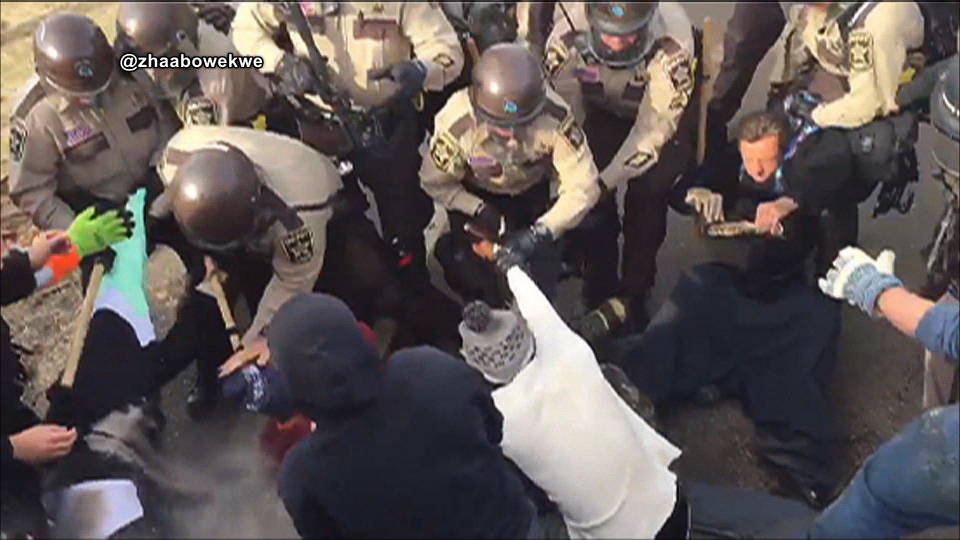 In North Dakota, hundreds of heavily armed police with military hardware raided a resistance camp established by Native American water protectors in the path of the proposed $3.8 billion Dakota Access pipeline. On Thursday afternoon, over 100 officers in riot gear with automatic rifles lined up across North Dakota’s Highway 1806, flanked by armored personnel carriers, a sound cannon, Humvees driven by National Guardsmen, an armored police truck and a bulldozer. Water protectors say police deployed tear gas, pepper spray, Tasers, concussion grenades and bean bag rounds against the Native Americans, and shot rubber bullets at their horses.
In North Dakota, hundreds of heavily armed police with military hardware raided a resistance camp established by Native American water protectors in the path of the proposed $3.8 billion Dakota Access pipeline. On Thursday afternoon, over 100 officers in riot gear with automatic rifles lined up across North Dakota’s Highway 1806, flanked by armored personnel carriers, a sound cannon, Humvees driven by National Guardsmen, an armored police truck and a bulldozer. Water protectors say police deployed tear gas, pepper spray, Tasers, concussion grenades and bean bag rounds against the Native Americans, and shot rubber bullets at their horses.
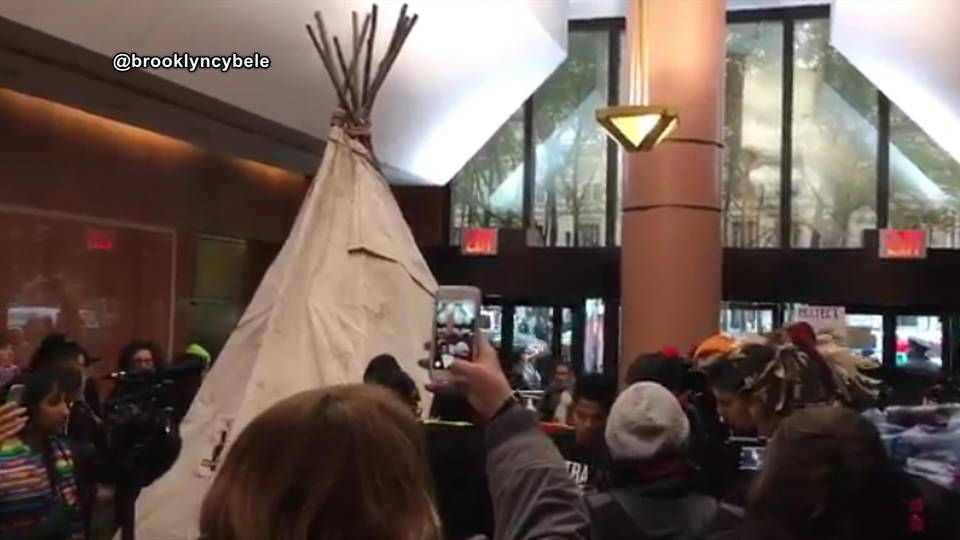 Thursday’s mass arrests came as Native American youth flooded the Hillary Clinton campaign headquarters in Brooklyn to demand Clinton oppose the Dakota Access pipeline. After Clinton campaign staffers declined to meet with the delegation, they attempted to present a letter to security guards.
Thursday’s mass arrests came as Native American youth flooded the Hillary Clinton campaign headquarters in Brooklyn to demand Clinton oppose the Dakota Access pipeline. After Clinton campaign staffers declined to meet with the delegation, they attempted to present a letter to security guards.
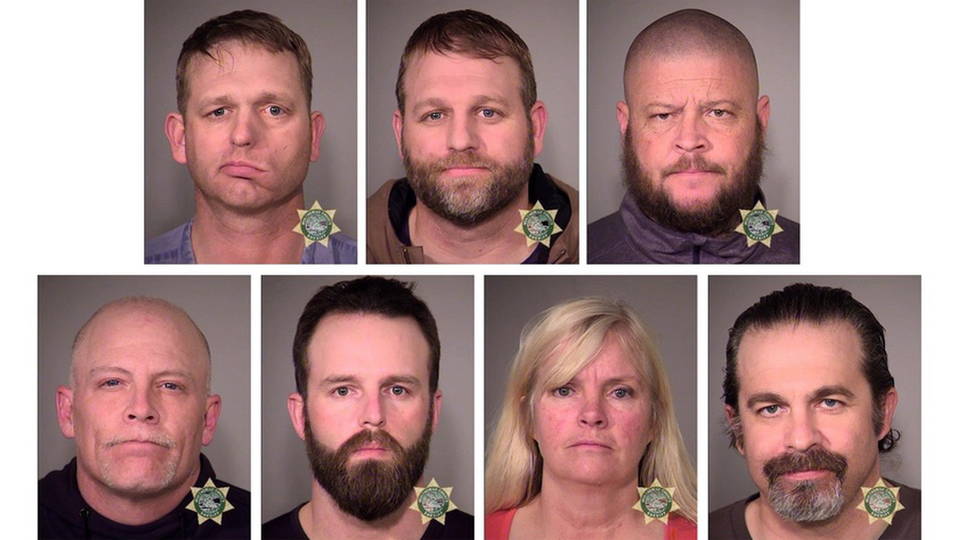 In Oregon, a federal jury on Thursday acquitted anti-government militia leaders Ammon and Ryan Bundy and five of their followers of conspiracy and weapons charges related to their armed takeover of a federal wildlife refuge earlier this year. The stunning verdict shocked federal prosecutors, who called the 41-day occupation of the Malheur National Wildlife Refuge a lawless scheme to seize federal property by force. The occupation forced federal employees onto administrative leave, cost the federal government over $4 million and alarmed local residents. It also angered the Paiute Tribe, which has treaty rights to the land the militia occupied. The tribe says militia members mishandled tribal artifacts and bulldozed sacred sites. Militia leaders Ammon and Ryan Bundy still face federal charges related to an armed standoff in Nevada in 2014.
In Oregon, a federal jury on Thursday acquitted anti-government militia leaders Ammon and Ryan Bundy and five of their followers of conspiracy and weapons charges related to their armed takeover of a federal wildlife refuge earlier this year. The stunning verdict shocked federal prosecutors, who called the 41-day occupation of the Malheur National Wildlife Refuge a lawless scheme to seize federal property by force. The occupation forced federal employees onto administrative leave, cost the federal government over $4 million and alarmed local residents. It also angered the Paiute Tribe, which has treaty rights to the land the militia occupied. The tribe says militia members mishandled tribal artifacts and bulldozed sacred sites. Militia leaders Ammon and Ryan Bundy still face federal charges related to an armed standoff in Nevada in 2014.
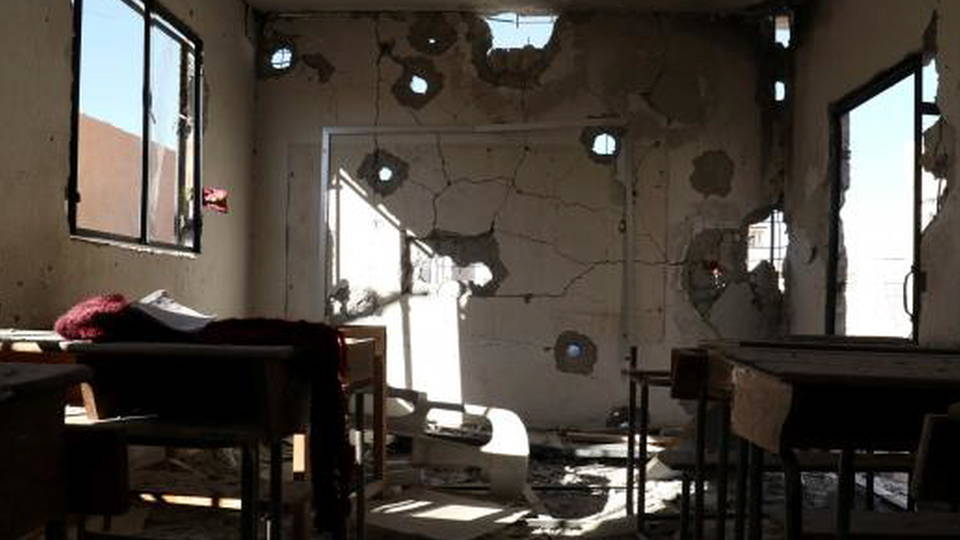 U.N. Secretary-General Ban Ki-moon is demanding an investigation into a strike on a school in Idlib, Syria, that killed 26 civilians, mostly children. Ban’s spokesperson said the attack could amount to a war crime.
U.N. Secretary-General Ban Ki-moon is demanding an investigation into a strike on a school in Idlib, Syria, that killed 26 civilians, mostly children. Ban’s spokesperson said the attack could amount to a war crime.
 Iraq faces what could become the largest humanitarian crisis in its history, with hundreds of thousands set to be displaced during a U.S.-backed offensive aimed at retaking the city of Mosul from ISIS. The latest data from the U.N. shows more than 10,000 civilians have fled their homes since the launch of the offensive, with another 200,000 expected to flee in the next few weeks. The U.N. says it plans to build six camps capable of accommodating an estimated 80,000 civilians and can’t rule out as many as 1 million displaced civilians as the fight continues.
Iraq faces what could become the largest humanitarian crisis in its history, with hundreds of thousands set to be displaced during a U.S.-backed offensive aimed at retaking the city of Mosul from ISIS. The latest data from the U.N. shows more than 10,000 civilians have fled their homes since the launch of the offensive, with another 200,000 expected to flee in the next few weeks. The U.N. says it plans to build six camps capable of accommodating an estimated 80,000 civilians and can’t rule out as many as 1 million displaced civilians as the fight continues.
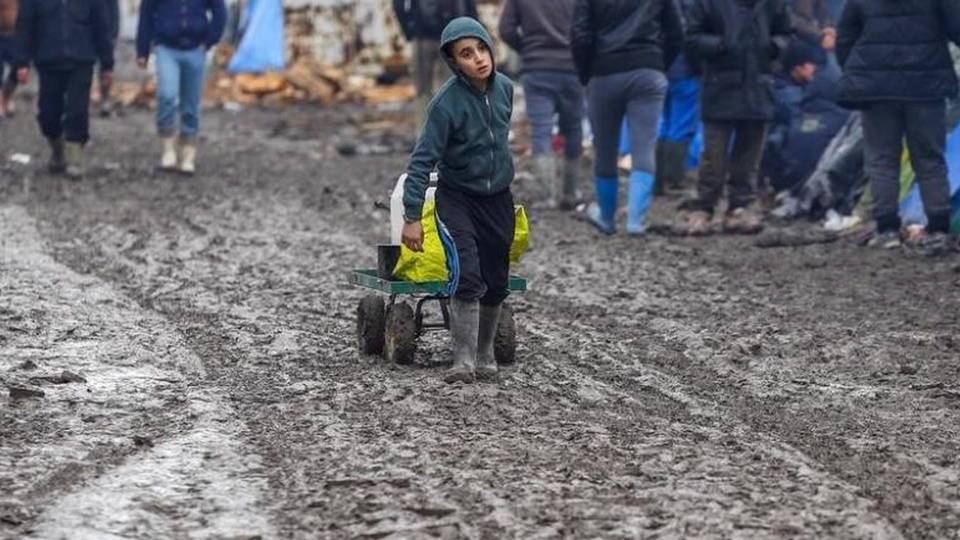 In Calais, France, aid workers say dozens of children were left without shelter for a second consecutive night, after authorities lured them from the ruins of their refugee camp, known as "The Jungle," with false promises of help. French authorities told the unaccompanied minors to line up for buses that would carry them to new refugee centers, where they could apply for asylum or reunification with families in the U.K. But the teenagers were literally left out in the cold when the buses failed to materialize and riot police prevented them from re-entering the camp. This is Dorothy Sang of the charity Save the Children.
In Calais, France, aid workers say dozens of children were left without shelter for a second consecutive night, after authorities lured them from the ruins of their refugee camp, known as "The Jungle," with false promises of help. French authorities told the unaccompanied minors to line up for buses that would carry them to new refugee centers, where they could apply for asylum or reunification with families in the U.K. But the teenagers were literally left out in the cold when the buses failed to materialize and riot police prevented them from re-entering the camp. This is Dorothy Sang of the charity Save the Children.
 On the campaign trail, Donald Trump repeated a campaign pledge to end all immigration by Syrian refugees and others from what he called "terror-prone nations." Trump was speaking Thursday in Springfield, Ohio.
On the campaign trail, Donald Trump repeated a campaign pledge to end all immigration by Syrian refugees and others from what he called "terror-prone nations." Trump was speaking Thursday in Springfield, Ohio.
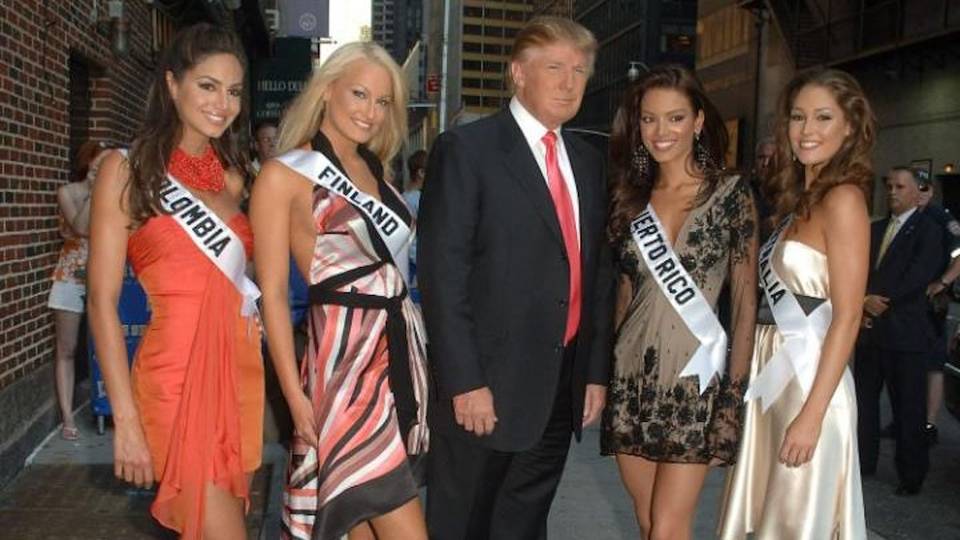 Meanwhile, another woman has come forward to accuse Donald Trump of sexual assault. Ninni Laaksonen, a former Miss Finland in the Miss Universe beauty pageant that Trump once owned, says Trump grabbed her buttocks during a photoshoot in 2006. Laaksonen is the 12th woman to accuse Trump of unwanted sexual contact since the release of a 2005 "Access Hollywood" tape in which Trump boasted of sexually assaulting women.
Meanwhile, another woman has come forward to accuse Donald Trump of sexual assault. Ninni Laaksonen, a former Miss Finland in the Miss Universe beauty pageant that Trump once owned, says Trump grabbed her buttocks during a photoshoot in 2006. Laaksonen is the 12th woman to accuse Trump of unwanted sexual contact since the release of a 2005 "Access Hollywood" tape in which Trump boasted of sexually assaulting women.
 Russian President Vladimir Putin has weighed in on claims that he’s meddling in the U.S. election. Putin made the remarks Thursday in southern Russia.
Russian President Vladimir Putin has weighed in on claims that he’s meddling in the U.S. election. Putin made the remarks Thursday in southern Russia.
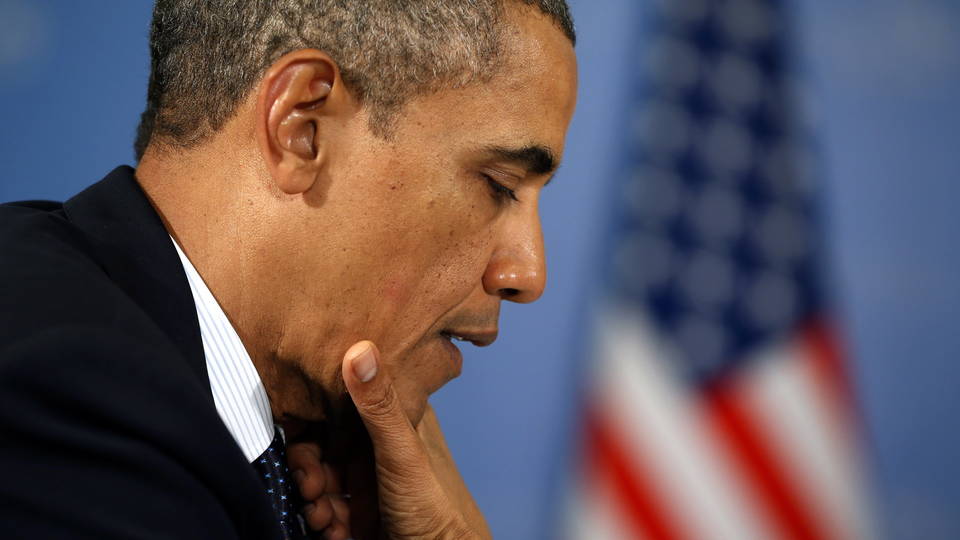 President Obama on Thursday granted clemency to 98 federal prisoners, bringing the total number of inmates whose sentences he’s commuted to nearly 900. That’s more than the previous 11 presidents combined. Many of the prisoners received harsh sentences under mandatory minimum drug laws that critics say targeted communities of color. Obama has also rejected a record number of commutations—a result of a surge in applications since a clemency initiative announced in 2014.
President Obama on Thursday granted clemency to 98 federal prisoners, bringing the total number of inmates whose sentences he’s commuted to nearly 900. That’s more than the previous 11 presidents combined. Many of the prisoners received harsh sentences under mandatory minimum drug laws that critics say targeted communities of color. Obama has also rejected a record number of commutations—a result of a surge in applications since a clemency initiative announced in 2014.
 In the Venezuelan capital of Caracas, clashes broke out Thursday as the country’s increasingly militant opposition stepped up efforts to oust President Nicolás Maduro. Opposition leaders have called for a national strike today and a march to the presidential palace in Caracas, unless the election board allows for a stalled referendum on whether to recall President Maduro. Each side has accused the other of attempting a coup. Venezuela’s political unrest comes as the country is grappling with a massive economic crisis, which has led to shortages of food, medicine and other necessary goods. We’ll have more on the crisis in Venezuela later in the broadcast.
In the Venezuelan capital of Caracas, clashes broke out Thursday as the country’s increasingly militant opposition stepped up efforts to oust President Nicolás Maduro. Opposition leaders have called for a national strike today and a march to the presidential palace in Caracas, unless the election board allows for a stalled referendum on whether to recall President Maduro. Each side has accused the other of attempting a coup. Venezuela’s political unrest comes as the country is grappling with a massive economic crisis, which has led to shortages of food, medicine and other necessary goods. We’ll have more on the crisis in Venezuela later in the broadcast.
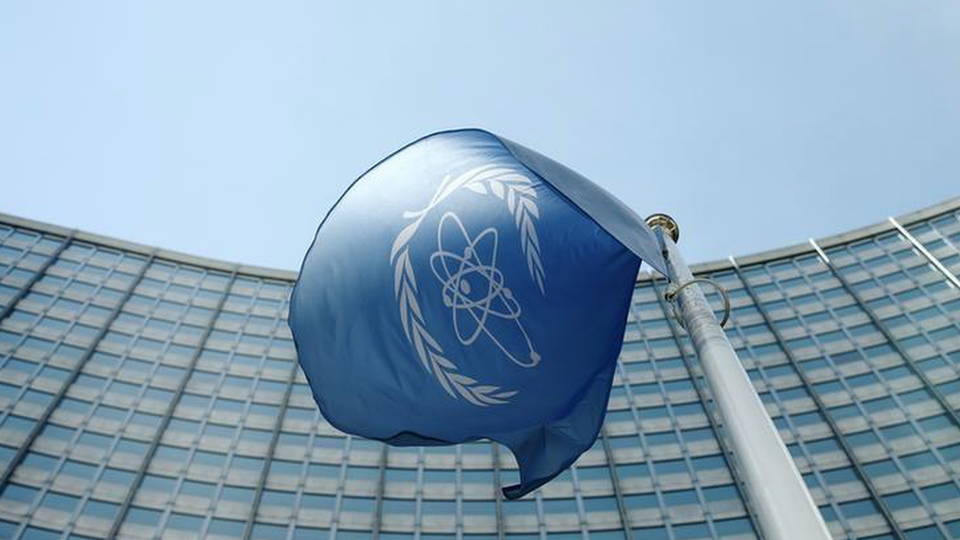 The United Nations on Thursday voted overwhelmingly to start talks aimed at abolishing all nuclear weapons. The landmark resolution will see the U.N. convene a conference next year to negotiate a legally binding instrument for worldwide nuclear prohibition. The vote was 123-38, with 16 countries abstaining. [Not supporting the measure] were all nine known nuclear states: China, Russia, France, the U.K., India, Pakistan, Israel, North Korea and the United States.
The United Nations on Thursday voted overwhelmingly to start talks aimed at abolishing all nuclear weapons. The landmark resolution will see the U.N. convene a conference next year to negotiate a legally binding instrument for worldwide nuclear prohibition. The vote was 123-38, with 16 countries abstaining. [Not supporting the measure] were all nine known nuclear states: China, Russia, France, the U.K., India, Pakistan, Israel, North Korea and the United States.
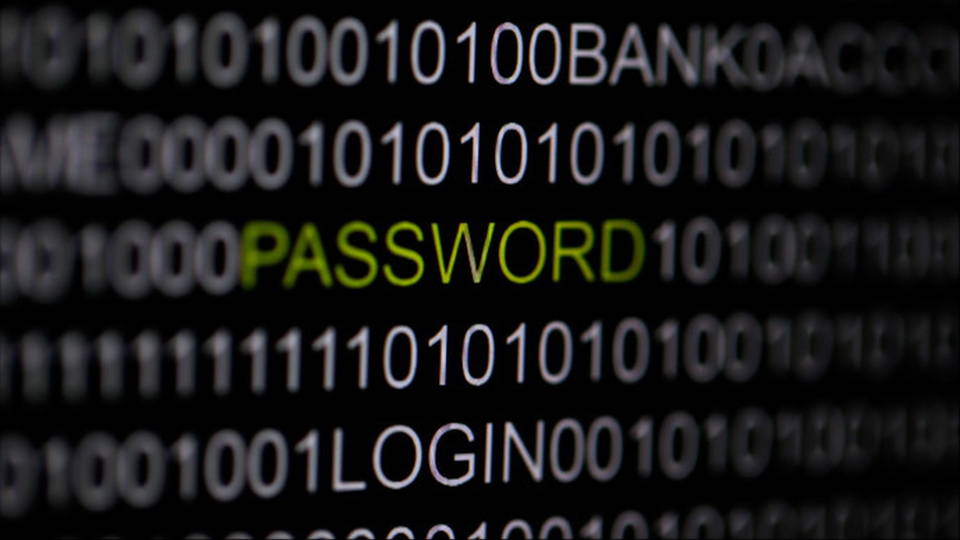 Broadband internet providers will need to ask for permission if they want to sell customers’ private data to third parties, under new rules adopted Thursday by the Federal Communications Commission. Watchdog groups are hailing the move as a major step forward on internet privacy. The media reform group Free Press said, "The companies that carry all of our speech online have no business profiting from all the information they gather without our consent." The rules do not require internet providers to get clear permission before using private customer data themselves.
Broadband internet providers will need to ask for permission if they want to sell customers’ private data to third parties, under new rules adopted Thursday by the Federal Communications Commission. Watchdog groups are hailing the move as a major step forward on internet privacy. The media reform group Free Press said, "The companies that carry all of our speech online have no business profiting from all the information they gather without our consent." The rules do not require internet providers to get clear permission before using private customer data themselves.
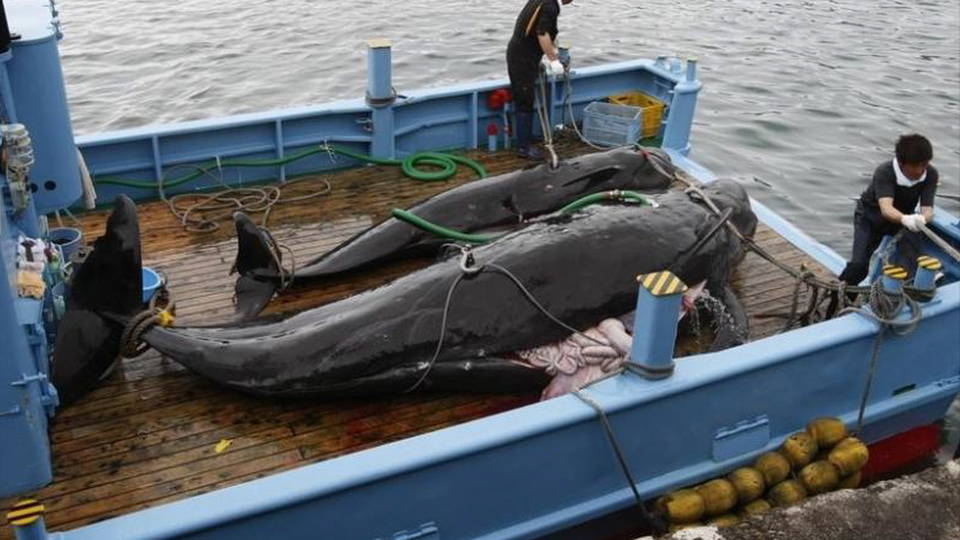 The world’s whaling watchdog agency moved Thursday to restrict Japan’s annual whale hunt, rejecting claims by Japanese whalers that they kill the marine mammals for scientific research. Advocate Nicolas Entrup of the group OceanCare applauded the move by the International Whaling Commission, but said the organization lacked the teeth needed to enforce its decision.
The world’s whaling watchdog agency moved Thursday to restrict Japan’s annual whale hunt, rejecting claims by Japanese whalers that they kill the marine mammals for scientific research. Advocate Nicolas Entrup of the group OceanCare applauded the move by the International Whaling Commission, but said the organization lacked the teeth needed to enforce its decision.
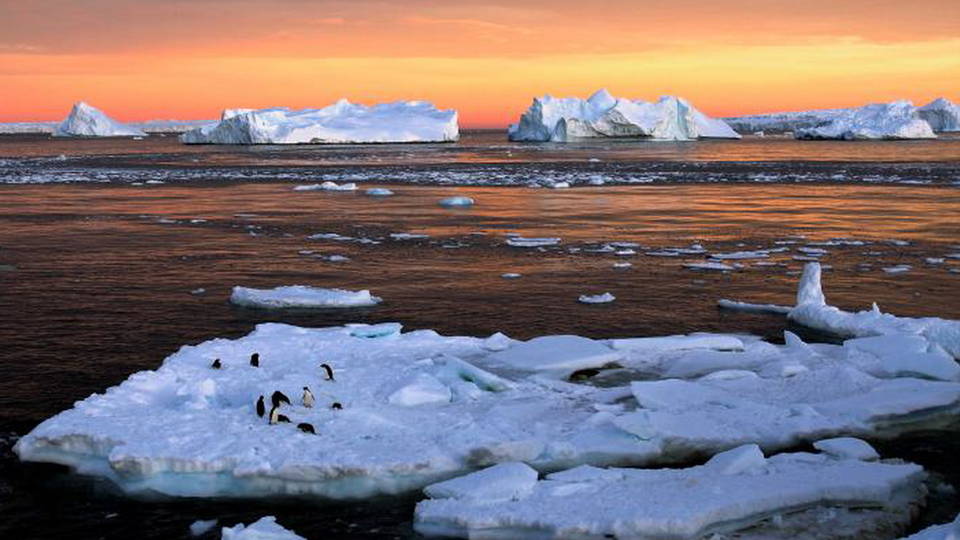 And a United Nations agency has concluded a deal to create the world’s largest marine reserve. Today’s agreement sets aside an area in Antarctica’s Ross Sea that’s nearly as big as the state of Alaska. This is U.S. State Department official Evan Bloom.
And a United Nations agency has concluded a deal to create the world’s largest marine reserve. Today’s agreement sets aside an area in Antarctica’s Ross Sea that’s nearly as big as the state of Alaska. This is U.S. State Department official Evan Bloom.
Donate today:
Follow:



SPEAKING EVENTS
 In North Dakota, hundreds of heavily armed police with military hardware raided a resistance camp established by Native American water protectors in the path of the proposed $3.8 billion Dakota Access pipeline. On Thursday afternoon, over 100 officers in riot gear with automatic rifles lined up across North Dakota’s Highway 1806, flanked by armored personnel carriers, a sound cannon, Humvees driven by National Guardsmen, an armored police truck and a bulldozer. Water protectors say police deployed tear gas, pepper spray, Tasers, concussion grenades and bean bag rounds against the Native Americans, and shot rubber bullets at their horses.
In North Dakota, hundreds of heavily armed police with military hardware raided a resistance camp established by Native American water protectors in the path of the proposed $3.8 billion Dakota Access pipeline. On Thursday afternoon, over 100 officers in riot gear with automatic rifles lined up across North Dakota’s Highway 1806, flanked by armored personnel carriers, a sound cannon, Humvees driven by National Guardsmen, an armored police truck and a bulldozer. Water protectors say police deployed tear gas, pepper spray, Tasers, concussion grenades and bean bag rounds against the Native Americans, and shot rubber bullets at their horses.Tara Houska: "The police are protecting and serving a pipeline, and protecting fossil fuel profits over human beings. They’re macing people. They’re [bleep] tasing them in the face."
Water Protector: "Lock arms! Lock arms! Lock up!"
Water protectors used cars to blockade a highway, and set fire to hay bales and tires. Police arrested two people they accused of firing gunshots. Four people locked themselves to a truck parked in the middle of the highway in efforts to stop the police advance. At least 141 people were arrested. Dakota Access pipeline company cranes and bulldozers were active just behind the police line, on the site of the tribal burial ground where Dakota Access security guards unleashed dogs on Native Americans on September 3. After headlines, we’ll go to North Dakota for the latest on the standoff at Standing Rock.
Dakota Access Pipeline Protest Targets Clinton Campaign Headquarters
 Thursday’s mass arrests came as Native American youth flooded the Hillary Clinton campaign headquarters in Brooklyn to demand Clinton oppose the Dakota Access pipeline. After Clinton campaign staffers declined to meet with the delegation, they attempted to present a letter to security guards.
Thursday’s mass arrests came as Native American youth flooded the Hillary Clinton campaign headquarters in Brooklyn to demand Clinton oppose the Dakota Access pipeline. After Clinton campaign staffers declined to meet with the delegation, they attempted to present a letter to security guards.Protester 1: "We humbly ask you to take this letter from us."
Protester 2: "Please, take the letter."
Protesters: "Take the letter! Take the letter! Take the letter!"
The protesters were later ordered by police to leave or face arrest. While Vermont Senator Bernie Sanders has come out against the pipeline, Clinton has so far refused to take a stance on Dakota Access. In the Clinton campaign’s first statement on the pipeline, spokesperson Tyrone Gayle wrote, in part, "Now, all of the parties involved ... need to find a path forward that serves the broadest public interest. As that happens, it’s important that on the ground in North Dakota, everyone respects demonstrators’ rights to protest peacefully, and workers’ rights to do their jobs safely." Climate activist and 350.org founder Bill McKibben responded on Twitter, writing, "Hillary Clinton managed to make a statement about the Dakota Pipeline that literally says nothing. Literally."
Oregon Militia Members Acquitted in Armed Standoff at Wildlife Refuge
 In Oregon, a federal jury on Thursday acquitted anti-government militia leaders Ammon and Ryan Bundy and five of their followers of conspiracy and weapons charges related to their armed takeover of a federal wildlife refuge earlier this year. The stunning verdict shocked federal prosecutors, who called the 41-day occupation of the Malheur National Wildlife Refuge a lawless scheme to seize federal property by force. The occupation forced federal employees onto administrative leave, cost the federal government over $4 million and alarmed local residents. It also angered the Paiute Tribe, which has treaty rights to the land the militia occupied. The tribe says militia members mishandled tribal artifacts and bulldozed sacred sites. Militia leaders Ammon and Ryan Bundy still face federal charges related to an armed standoff in Nevada in 2014.
In Oregon, a federal jury on Thursday acquitted anti-government militia leaders Ammon and Ryan Bundy and five of their followers of conspiracy and weapons charges related to their armed takeover of a federal wildlife refuge earlier this year. The stunning verdict shocked federal prosecutors, who called the 41-day occupation of the Malheur National Wildlife Refuge a lawless scheme to seize federal property by force. The occupation forced federal employees onto administrative leave, cost the federal government over $4 million and alarmed local residents. It also angered the Paiute Tribe, which has treaty rights to the land the militia occupied. The tribe says militia members mishandled tribal artifacts and bulldozed sacred sites. Militia leaders Ammon and Ryan Bundy still face federal charges related to an armed standoff in Nevada in 2014.TOPICS:
U.N. Secretary-General Demands Investigation into Idlib School Attack
 U.N. Secretary-General Ban Ki-moon is demanding an investigation into a strike on a school in Idlib, Syria, that killed 26 civilians, mostly children. Ban’s spokesperson said the attack could amount to a war crime.
U.N. Secretary-General Ban Ki-moon is demanding an investigation into a strike on a school in Idlib, Syria, that killed 26 civilians, mostly children. Ban’s spokesperson said the attack could amount to a war crime.Stéphane Dujarric: "The secretary-general calls for an immediate and impartial investigation of this and other similar attacks against civilians in Syria. If such horrific acts persist despite global outrage, it is largely because their authors, whether in corridors of power or in insurgent redoubts, do not fear justice. They must be proved wrong."
Russia’s Defense Ministry denied that its warplanes were responsible for the attack. It released drone footage that it claimed showed the school was not struck from the air, and accused the Syrian Observatory for Human Rights and the Civil Defense Network, or "White Helmets," of spreading propaganda. In Washington, a White House spokesperson said either Syrian or Russian warplanes were to blame.
TOPICS:
Iraq: Up to 1 Million Could Become Displaced by Mosul Offensive
 Iraq faces what could become the largest humanitarian crisis in its history, with hundreds of thousands set to be displaced during a U.S.-backed offensive aimed at retaking the city of Mosul from ISIS. The latest data from the U.N. shows more than 10,000 civilians have fled their homes since the launch of the offensive, with another 200,000 expected to flee in the next few weeks. The U.N. says it plans to build six camps capable of accommodating an estimated 80,000 civilians and can’t rule out as many as 1 million displaced civilians as the fight continues.
Iraq faces what could become the largest humanitarian crisis in its history, with hundreds of thousands set to be displaced during a U.S.-backed offensive aimed at retaking the city of Mosul from ISIS. The latest data from the U.N. shows more than 10,000 civilians have fled their homes since the launch of the offensive, with another 200,000 expected to flee in the next few weeks. The U.N. says it plans to build six camps capable of accommodating an estimated 80,000 civilians and can’t rule out as many as 1 million displaced civilians as the fight continues.France: Refugee Children in "The Jungle" Left Without Shelter
 In Calais, France, aid workers say dozens of children were left without shelter for a second consecutive night, after authorities lured them from the ruins of their refugee camp, known as "The Jungle," with false promises of help. French authorities told the unaccompanied minors to line up for buses that would carry them to new refugee centers, where they could apply for asylum or reunification with families in the U.K. But the teenagers were literally left out in the cold when the buses failed to materialize and riot police prevented them from re-entering the camp. This is Dorothy Sang of the charity Save the Children.
In Calais, France, aid workers say dozens of children were left without shelter for a second consecutive night, after authorities lured them from the ruins of their refugee camp, known as "The Jungle," with false promises of help. French authorities told the unaccompanied minors to line up for buses that would carry them to new refugee centers, where they could apply for asylum or reunification with families in the U.K. But the teenagers were literally left out in the cold when the buses failed to materialize and riot police prevented them from re-entering the camp. This is Dorothy Sang of the charity Save the Children.Dorothy Sang: "What is really concerning is it’s getting dark. It’s really cold. And these children have had enough. Like they’ve been waiting months to be put in protective shelter, and now, once again, we’ve sat them there. We were asked to encourage them to get on these buses that never materialized."
Donald Trump Promises to End Syrian Refugee Resettlement Program
 On the campaign trail, Donald Trump repeated a campaign pledge to end all immigration by Syrian refugees and others from what he called "terror-prone nations." Trump was speaking Thursday in Springfield, Ohio.
On the campaign trail, Donald Trump repeated a campaign pledge to end all immigration by Syrian refugees and others from what he called "terror-prone nations." Trump was speaking Thursday in Springfield, Ohio.Donald Trump: "We’re not going to take the risk when it comes to the safety of the American people, no longer. So let me state this as clearly as I can: If I’m elected president, I am going to keep radical Islamic terrorists the hell out of our country."
TOPICS:
Twelfth Woman Accuses Donald Trump of Sexual Assault
 Meanwhile, another woman has come forward to accuse Donald Trump of sexual assault. Ninni Laaksonen, a former Miss Finland in the Miss Universe beauty pageant that Trump once owned, says Trump grabbed her buttocks during a photoshoot in 2006. Laaksonen is the 12th woman to accuse Trump of unwanted sexual contact since the release of a 2005 "Access Hollywood" tape in which Trump boasted of sexually assaulting women.
Meanwhile, another woman has come forward to accuse Donald Trump of sexual assault. Ninni Laaksonen, a former Miss Finland in the Miss Universe beauty pageant that Trump once owned, says Trump grabbed her buttocks during a photoshoot in 2006. Laaksonen is the 12th woman to accuse Trump of unwanted sexual contact since the release of a 2005 "Access Hollywood" tape in which Trump boasted of sexually assaulting women.TOPICS:
Russian President Denies Meddling in U.S. Election
 Russian President Vladimir Putin has weighed in on claims that he’s meddling in the U.S. election. Putin made the remarks Thursday in southern Russia.
Russian President Vladimir Putin has weighed in on claims that he’s meddling in the U.S. election. Putin made the remarks Thursday in southern Russia.President Vladimir Putin: "Does anyone seriously think that Russia can in some way influence the choice of the American people? Is America some kind of banana republic? America is a great country, correct me if I am wrong."
Hillary Clinton has accused rival Donald Trump of being a "puppet" of Putin. She also says Russia is behind the theft of campaign emails made public through WikiLeaks.
TOPICS:
President Obama Grants Clemency to 98 More Prisoners
 President Obama on Thursday granted clemency to 98 federal prisoners, bringing the total number of inmates whose sentences he’s commuted to nearly 900. That’s more than the previous 11 presidents combined. Many of the prisoners received harsh sentences under mandatory minimum drug laws that critics say targeted communities of color. Obama has also rejected a record number of commutations—a result of a surge in applications since a clemency initiative announced in 2014.
President Obama on Thursday granted clemency to 98 federal prisoners, bringing the total number of inmates whose sentences he’s commuted to nearly 900. That’s more than the previous 11 presidents combined. Many of the prisoners received harsh sentences under mandatory minimum drug laws that critics say targeted communities of color. Obama has also rejected a record number of commutations—a result of a surge in applications since a clemency initiative announced in 2014.Venezuela: Opposition Calls National Strike in Bid to Oust President
 In the Venezuelan capital of Caracas, clashes broke out Thursday as the country’s increasingly militant opposition stepped up efforts to oust President Nicolás Maduro. Opposition leaders have called for a national strike today and a march to the presidential palace in Caracas, unless the election board allows for a stalled referendum on whether to recall President Maduro. Each side has accused the other of attempting a coup. Venezuela’s political unrest comes as the country is grappling with a massive economic crisis, which has led to shortages of food, medicine and other necessary goods. We’ll have more on the crisis in Venezuela later in the broadcast.
In the Venezuelan capital of Caracas, clashes broke out Thursday as the country’s increasingly militant opposition stepped up efforts to oust President Nicolás Maduro. Opposition leaders have called for a national strike today and a march to the presidential palace in Caracas, unless the election board allows for a stalled referendum on whether to recall President Maduro. Each side has accused the other of attempting a coup. Venezuela’s political unrest comes as the country is grappling with a massive economic crisis, which has led to shortages of food, medicine and other necessary goods. We’ll have more on the crisis in Venezuela later in the broadcast.TOPICS:
United Nations Begins Global Nuclear Disarmament Negotiations
 The United Nations on Thursday voted overwhelmingly to start talks aimed at abolishing all nuclear weapons. The landmark resolution will see the U.N. convene a conference next year to negotiate a legally binding instrument for worldwide nuclear prohibition. The vote was 123-38, with 16 countries abstaining. [Not supporting the measure] were all nine known nuclear states: China, Russia, France, the U.K., India, Pakistan, Israel, North Korea and the United States.
The United Nations on Thursday voted overwhelmingly to start talks aimed at abolishing all nuclear weapons. The landmark resolution will see the U.N. convene a conference next year to negotiate a legally binding instrument for worldwide nuclear prohibition. The vote was 123-38, with 16 countries abstaining. [Not supporting the measure] were all nine known nuclear states: China, Russia, France, the U.K., India, Pakistan, Israel, North Korea and the United States.TOPICS:
New FCC Rule Limits Internet Providers from Selling Customer Data
 Broadband internet providers will need to ask for permission if they want to sell customers’ private data to third parties, under new rules adopted Thursday by the Federal Communications Commission. Watchdog groups are hailing the move as a major step forward on internet privacy. The media reform group Free Press said, "The companies that carry all of our speech online have no business profiting from all the information they gather without our consent." The rules do not require internet providers to get clear permission before using private customer data themselves.
Broadband internet providers will need to ask for permission if they want to sell customers’ private data to third parties, under new rules adopted Thursday by the Federal Communications Commission. Watchdog groups are hailing the move as a major step forward on internet privacy. The media reform group Free Press said, "The companies that carry all of our speech online have no business profiting from all the information they gather without our consent." The rules do not require internet providers to get clear permission before using private customer data themselves.Watchdog Tightens Rules Aimed at Curbing Japanese Whale Hunt
 The world’s whaling watchdog agency moved Thursday to restrict Japan’s annual whale hunt, rejecting claims by Japanese whalers that they kill the marine mammals for scientific research. Advocate Nicolas Entrup of the group OceanCare applauded the move by the International Whaling Commission, but said the organization lacked the teeth needed to enforce its decision.
The world’s whaling watchdog agency moved Thursday to restrict Japan’s annual whale hunt, rejecting claims by Japanese whalers that they kill the marine mammals for scientific research. Advocate Nicolas Entrup of the group OceanCare applauded the move by the International Whaling Commission, but said the organization lacked the teeth needed to enforce its decision.Nicolas Entrup: "Our concern, of course, remains, because so far, even with the ruling of the International Court of Justice, Japan has not stuck to that ruling and has ignored it. It continued scientific whaling under a new name, but very little has changed."
TOPICS:
World's Largest Marine Sanctuary Created in Antarctica
 And a United Nations agency has concluded a deal to create the world’s largest marine reserve. Today’s agreement sets aside an area in Antarctica’s Ross Sea that’s nearly as big as the state of Alaska. This is U.S. State Department official Evan Bloom.
And a United Nations agency has concluded a deal to create the world’s largest marine reserve. Today’s agreement sets aside an area in Antarctica’s Ross Sea that’s nearly as big as the state of Alaska. This is U.S. State Department official Evan Bloom.Evan Bloom: "We’ve had a real achievement today. We’ve created the world’s largest marine protected area, and that’s a major step forward for marine conservation globally. So, it’s a wonderful moment."
The marine sanctuary is home to whales, seals, penguins and other animals. The agreement on the Ross Sea sanctuary came as the World Wildlife Fund released a shocking new study that finds more than two-thirds of the world’s wildlife could be gone by 2020.
TOPICS:
The original content of this program is licensed under a Creative Commons Attribution-Noncommercial-No Derivative Works 3.0 United States License. Please attribute legal copies of this work to democracynow.org. Some of the work(s) that this program incorporates, however, may be separately licensed. For further information or additional permissions, contact us.
-------Donate today:
Follow:




SPEAKING EVENTS

Sekou Odinga on 15 Black Panthers Still in Prison, How He Organized Behind Bars & #BlackLivesMatter
DN! INTERNSHIPS

Apply today to be a Democracy Now! intern
WORK WITH DN!

Senior TV Producer
207 West 25th Street, 11th Floor
New York, New York 10001, United States
-------
-------



No comments:
Post a Comment